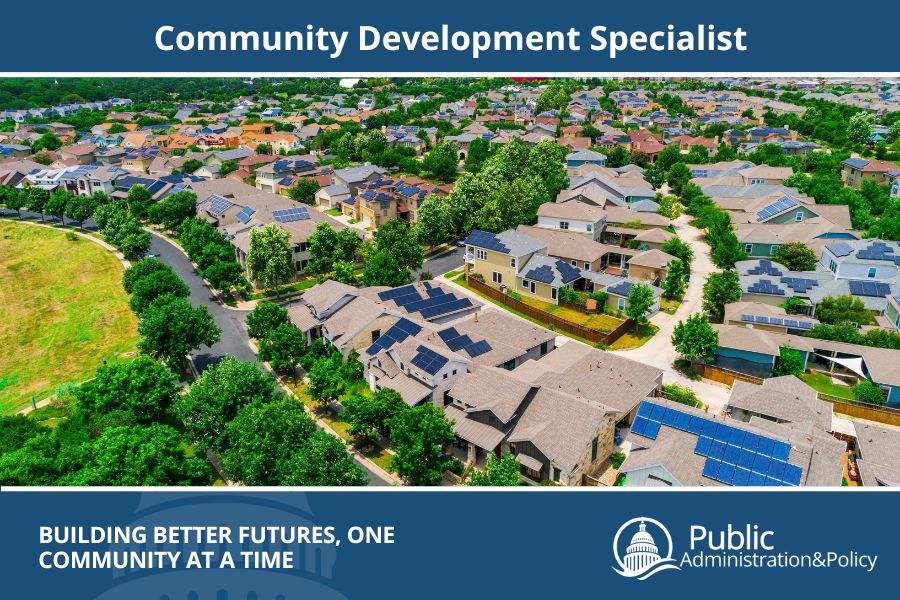How to Become a Community Development Specialist
Empower Neighborhoods and Foster Opportunities for Meaningful Change That Lasts
Community Development Specialists are the unsung heroes of local and state governments, nonprofit organizations, and public service initiatives. They focus on creating programs that enhance the quality of life within communities, tackling issues such as housing, education, economic development, and public safety. This role is ideal for individuals passionate about public affairs and community service, offering a fulfilling career in the public sector. Whether working with elected officials or civil servants, these professionals drive meaningful change in the United States.

Table of Contents
What Is a Community Development Specialist?
A Community Development Specialist is a professional who designs, implements, and evaluates programs to improve community well-being. They work closely with local governments, nonprofit organizations, and private-sector stakeholders to address issues such as economic inequality, housing shortages, and public safety.
Key Responsibilities
- Program Development: Designing community service initiatives, such as affordable housing, public health campaigns, and emergency management preparedness.
- Stakeholder Engagement involves collaborating with elected officials, business leaders, and community members to identify and address local needs.
- Budget Management: Allocating resources effectively and ensuring compliance with federal regulations.
- Grant Writing and Management: Securing funding for community programs and tracking expenditures.
- Data Analysis: Using research methods to assess the success and impact of programs.
Community Development Specialists often serve as a bridge between the public sector and local communities, ensuring that government resources are utilized effectively.
“When people invest in community development, they invest in hope. It’s about creating opportunities for people to build better futures for themselves and their families.”
— Ben Carson, former U.S. Secretary of Housing and Urban Development (HUD)
Step 1: Complete Your Degree
Education is a cornerstone for aspiring Community Development Specialists. Degrees in Public Administration, Business Administration, or Public Policy equip candidates with the skills to address community challenges effectively.
Relevant Degrees for Community Development Specialists
- Bachelor of Public Administration: Provides foundational knowledge in government operations, public services, and budgeting.
- Master of Public Administration (MPA): Offers advanced training in leadership, public sector management, and federal regulations.
- Master of Business Administration (MBA): Focuses on financial management, strategic planning, and organizational leadership.
- Ph.D. in Public Administration or Public Policy: Prepares professionals for high-level research or academic careers in community development.
Why Consider Online Degree Programs?
Online programs in Public Administration and Public Policy offer flexibility for working professionals. Many schools in the United States offer online bachelor’s and master’s degrees designed for students who balance work, family, and education.
Explore degrees such as the Master of Public Administration to advance your career in community development.
Step 2: Learn About Community Development Specialist Salaries
Salaries for Community Development Specialists vary depending on location, education level, and experience. However, this career offers competitive pay and significant opportunities for advancement.
Average Salary Ranges
- Entry-Level Roles: $45,000–$60,000 annually.
- Mid-Career Roles: $60,000–$85,000 annually.
- Senior Roles: $85,000–$120,000 annually.
Factors Influencing Salary
- Education Level: A master’s degree, such as an MPA, often leads to higher salaries.
- Experience: Professionals with years of experience in community service or public management earn premium salaries.
- Sector: Public sector roles often provide robust benefits, while private sector roles may offer higher salaries.
Visit the Bureau of Labor Statistics (BLS) for additional salary insights and trends.
Step 3: Build Leadership and Community Engagement Skills
Community Development Specialists must possess strong leadership and engagement skills to navigate the complexities of public services and stakeholder needs. These skills are vital for addressing public safety, emergency management, and economic development challenges.
Key Skills for Community Development Specialists
- Strategic Planning: Crafting long-term plans to improve community infrastructure and services.
- Public Affairs Expertise: Communicating effectively with elected officials, civil servants, and the public.
- Budgeting Skills: Managing resources for projects while adhering to federal regulations.
- Cultural Competency: Addressing the diverse needs of local communities with sensitivity and inclusivity.
- Problem-Solving Abilities: Tackling real-world issues such as housing shortages and economic disparities.
Organizations like the National Community Development Association (NCDA) offer training programs to enhance these skills.
Step 4: Find a Community Development Specialist Job
Community Development Specialists are employed across various sectors, including local governments, nonprofit organizations, and private consulting firms. Networking, relevant experience, and monitoring job postings are essential for securing a position.
Industries Employing Community Development Specialists
- Local Governments: Managing public works, urban planning, and housing initiatives.
- Nonprofit Organizations: Leading programs focused on education, healthcare, and social equity.
- Private Sector: Advising on community-focused corporate social responsibility (CSR) initiatives.
Notable Employers
Regularly check platforms like Idealist or LinkedIn for job postings.
Career Opportunities in Community Development
Community Development Specialists have numerous opportunities to advance their careers or transition into related fields. Popular roles include:
- Economic Development Coordinator: Promoting local economic growth through strategic initiatives.
- Public Safety Program Manager: Leading initiatives that enhance emergency management and public safety.
- Grant Administrator: Managing funding for community improvement projects.
- Nonprofit Executive Director: Overseeing community-focused programs in nonprofit organizations.
Prominent employers offering these roles include:
Sources
- Bureau of Labor Statistics (BLS). “Occupational Outlook Handbook: Community and Social Service Occupations.” https://www.bls.gov
- National Community Development Association (NCDA). “Resources for Community Development Professionals.” https://ncdaonline.org
- Urban Institute. “Community Development and Housing.” https://www.urban.org
Acknowledgments
Content inspired by leading community development organizations, government agencies, and insights from professionals in the field.
